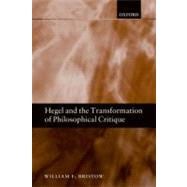
Note: Supplemental materials are not guaranteed with Rental or Used book purchases.
Purchase Benefits
What is included with this book?
| Abbreviations | p. xi |
| Introduction | p. 1 |
| Hegel's Objection | |
| Is Kant's Idealism Subjective? | p. 19 |
| An ambiguity in 'subjectivism' | p. 20 |
| The epistemological problem | p. 25 |
| The transcendental deduction of the categories and subjectivism | p. 28 |
| Are Kant's categories subjective? | p. 38 |
| Hegel's Suspicion: Kantian Critique and Subjectivism | p. 50 |
| What is Kantian philosophical criticism? | p. 53 |
| Hegel's suspicion: initial formulation | p. 61 |
| A shallow suspicion? | p. 64 |
| Deepening the suspicion: criticism, autonomy, and subjectivism | p. 68 |
| Directions of response | p. 88 |
| Critique and suspicion: unmasking the critical philosophy | p. 91 |
| Hegel's Transformation of Critique | |
| Introduction | p. 105 |
| The Rejection of Kantian Critique: Philosophy, Skepticism, and the Recovery of the Ancient Idea | p. 117 |
| Hegel's epistemology in the shadow of Schelling | p. 117 |
| Schulze's skepticism contra the critical philosophy | p. 122 |
| Ancient versus modern skepticism: Hegel's difference | p. 133 |
| Against the modern conception of rational cognition | p. 140 |
| Against modern self-certainty | p. 150 |
| The history of skepticism: decline into dogmatism | p. 155 |
| Philosophy counter culture and time | p. 164 |
| The Return to Kantian Critique: Recognizing the Rights of Ordinary Consciousness | p. 169 |
| Two conceptions of philosophical critique | p. 170 |
| The return to critique and the relation of philosophy to its history | p. 175 |
| The rights of ordinary consciousness and the need for critique | p. 182 |
| Critique as the realization of the science of metaphysics | p. 191 |
| Hegel's Self-transformational Criticism | p. 204 |
| Presuppositionless philosophy | p. 205 |
| The problem of the criterion | p. 213 |
| Self-transformational criticism | p. 218 |
| The problem of the 'we' | p. 230 |
| Our transformation | p. 238 |
| Hegel's alternative model: critical transformation as self-realization | p. 242 |
| Bibliography | p. 248 |
| Index | p. 254 |
| Table of Contents provided by Ingram. All Rights Reserved. |
The New copy of this book will include any supplemental materials advertised. Please check the title of the book to determine if it should include any access cards, study guides, lab manuals, CDs, etc.
The Used, Rental and eBook copies of this book are not guaranteed to include any supplemental materials. Typically, only the book itself is included. This is true even if the title states it includes any access cards, study guides, lab manuals, CDs, etc.